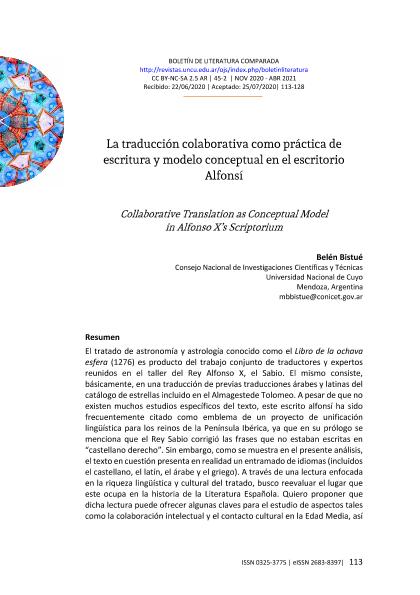Mostrar el registro sencillo del ítem
dc.contributor.author
Bistué, María Belén

dc.date.available
2021-06-24T14:49:00Z
dc.date.issued
2020-11
dc.identifier.citation
Bistué, María Belén; La traducción colaborativa como práctica de escritura y modelo conceptual en el escritorio Alfonsí; Universidad Nacional de Cuyo. Facultad de Filosofía y Letras; Boletín de Literatura Comparada; 2; 45; 11-2020; 113-128
dc.identifier.issn
0325-3775
dc.identifier.uri
http://hdl.handle.net/11336/134856
dc.description.abstract
El tratado de astronomía y astrología conocido como el Libro de la ochava esfera (1276) es producto del trabajo conjunto de traductores y expertos reunidos en el taller del Rey Alfonso X, e Sabio. El mismo consiste, básicamente, en una traducción de previas traducciones árabes y latinas del catálogo de estrellas incluido en el Almageste deTolomeo. A pesar de que no existen muchos estudios específicos del texto, este escrito alfonsí ha sido frecuentemente citado como emblema de un proyecto de unificación lingüística para los reinos de la Península Ibérica, ya que en su prólogo se menciona que el Rey Sabio corrigió las frases que no estaban escritas en "castellano derecho". Sin embargo, como se muestra en el presente análisis, el texto en cuestión presenta en realidad un entramado de idiomas (incluidos el castellano, el latín, elárabe y el griego). A través de una lectura enfocada en la riqueza lingüística y cultural del tratado, busco reevaluar el lugar que este ocupa en la historia de la Literatura Española. Quiero proponer que dicha lectura puede ofrecer algunas claves para el estudio de aspectos tales como la colaboración intelectual y el contacto cultural en la Edad Media, así como para el estudio de algunos de los distintos modelos conceptuales que estructuraban la producción textual en el escritorio alfonsí.
dc.description.abstract
The astronomical and astrological treatise known as The Book of the Eighth Sphere (1276) is the product of the joint work of translators and experts who served Alfonso X of Castile, the Learned. Basically, the work consists in a translation of previous Arabic and Latin translations of the star catalog that Ptolemy included in his Almagest. Although there are few specific studies of its text, the treatise is frequently cited as an emblem for the project of linguistic unification in the Iberian Peninsula, since its prologue states that the Learned King corrected the phrases that were not written in “straight Castilian.” Surprisingly, as the present analysis shows, the text itself is actually a combination of several languages (including Castilian, Latin, Arabic, and Greek). Through a reading focused on the treatise’s linguistic and cultural richness, I search to re-evaluate its place in the history of Spanish Literature. I believe that this reading can offer some keys for the study of intellectual collaboration and cultural contact in the Middle Ages, as well as for the study of some of the different conceptual models underlying textual production in Alfonso X’s scriptorium.
dc.format
application/pdf
dc.language.iso
spa
dc.publisher
Universidad Nacional de Cuyo. Facultad de Filosofía y Letras
dc.rights
info:eu-repo/semantics/openAccess
dc.rights.uri
https://creativecommons.org/licenses/by-nc-sa/2.5/ar/
dc.subject
TRADUCCIÓN COLABORATIVA
dc.subject
TRADUCCIÓN MULTILINGÜE
dc.subject
LIBRO DE LA OCHAVA ESFERA
dc.subject
ALFONSO X, EL SABIO
dc.subject.classification
Otras Lengua y Literatura

dc.subject.classification
Lengua y Literatura

dc.subject.classification
HUMANIDADES

dc.title
La traducción colaborativa como práctica de escritura y modelo conceptual en el escritorio Alfonsí
dc.title
Collaborative Translation as Conceptual Model in Alfonso X’s Scriptorium
dc.type
info:eu-repo/semantics/article
dc.type
info:ar-repo/semantics/artículo
dc.type
info:eu-repo/semantics/publishedVersion
dc.date.updated
2021-06-07T15:30:53Z
dc.identifier.eissn
2683-8397
dc.journal.volume
2
dc.journal.number
45
dc.journal.pagination
113-128
dc.journal.pais
Argentina

dc.journal.ciudad
Mendoza
dc.description.fil
Fil: Bistué, María Belén. Universidad Nacional de Cuyo. Facultad de Filosofía y Letras. Departamento de Letras. Centro de Literatura Comparada; Argentina. Consejo Nacional de Investigaciones Científicas y Técnicas. Centro Científico Tecnológico Conicet - Mendoza; Argentina
dc.journal.title
Boletín de Literatura Comparada
dc.relation.alternativeid
info:eu-repo/semantics/altIdentifier/url/https://revistas.uncu.edu.ar/ojs/index.php/boletinliteratura/article/view/4188
Archivos asociados
